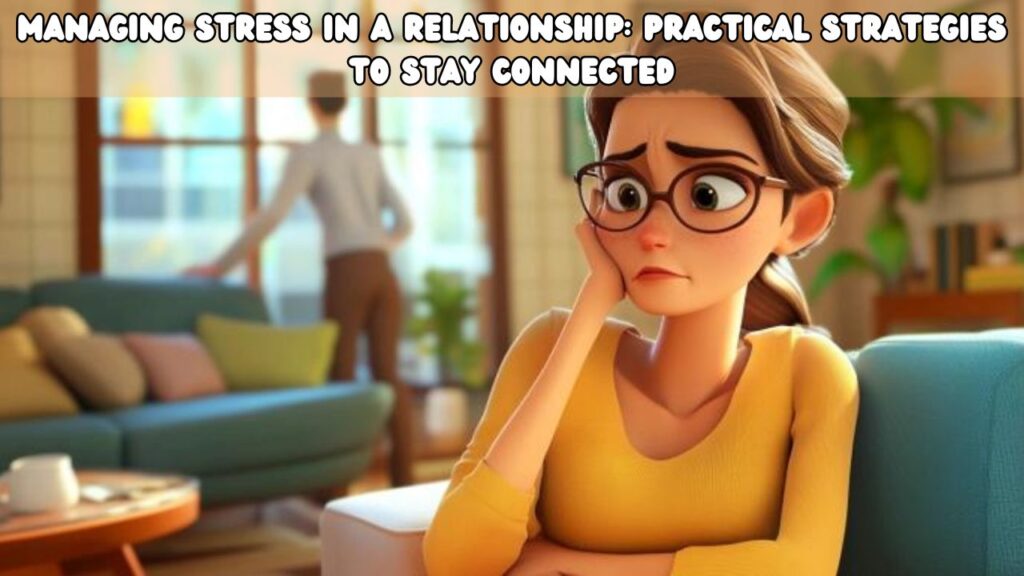Message to Dr. Hart
From: Emma
Age: 32
Partner: 34
Duration: 6 years
From: United States
“Hi Dr. Hart, my name is Emma, and I’ve been with my partner for 6 years. We’re both in our early 30s and live in the United States. Lately, we’ve both been under a lot of stress—work, family commitments, financial issues—and it’s taking a toll on our relationship. We’re more irritable with each other, and our communication has become strained. I’m worried that all this stress is pulling us apart. What can we do to manage stress without damaging our relationship? Any practical advice would be appreciated!”
Dr. Seraphina Hart’s Response:
Communicate Openly About Stress

When both partners are under stress, it’s easy for communication to become one of the first casualties. Instead of being able to speak openly, you may find that conversations quickly turn into arguments, or perhaps you avoid talking altogether to keep the peace. However, open communication is essential in these moments because it helps each partner feel heard and understood, which is critical to maintaining emotional closeness.
Stress can create emotional blind spots, where it becomes harder to see your partner’s perspective or recognize their needs. This is why regular, open conversations about what’s weighing on each of you are so important. Sharing your struggles can ease the emotional burden and remind you that you’re both on the same team, facing life’s challenges together. Importantly, these conversations don’t need to solve every problem—they are about connection, empathy, and understanding.
What You Can Do
Set aside time for “stress check-ins” at least once or twice a week. During these check-ins, you and your partner can talk about what’s been weighing on you without the expectation of fixing things right away. This is your chance to listen, support, and validate each other’s feelings. The goal is to foster emotional safety, so you can both feel that your stress is being acknowledged and understood by the person who matters most.
You might even create a routine around these check-ins, like discussing things over a cup of tea in the evening or during a quiet moment in the morning. Establishing a regular time helps ensure that you’re keeping the lines of communication open, even when things feel hectic.
Example
You might begin a conversation by saying, “I’ve noticed that the stress from work has been making me a bit distant, and I don’t want that to affect us. How are you feeling about everything that’s been going on with your job lately?”
This kind of sharing invites your partner to express themselves without feeling blamed or pressured to fix things, and it opens the door to more meaningful connection.
Prioritize Your Relationship

When life feels overwhelming, it’s natural for both of you to focus primarily on external problems, whether it’s work deadlines, financial concerns, or family responsibilities. The challenge is that in doing so, your relationship can often get neglected. Over time, this neglect can erode the intimacy and connection you once shared, making the relationship feel like another source of stress rather than a place of refuge and support.
While it may seem counterintuitive during busy or stressful times, it’s crucial to continue prioritizing your relationship. By making a deliberate effort to invest in your partnership, you reinforce the idea that you’re both working through challenges together and that your relationship is a source of strength, not additional pressure.
What You Can Do
Create small, consistent opportunities to connect with each other, even in the midst of your busy schedules. These don’t have to be grand gestures—sometimes, a simple 15 minutes of uninterrupted time can make a world of difference. Whether it’s enjoying a coffee together, taking a short walk around the neighborhood, or even cooking a meal together, these moments help you both decompress and remember that you’re in this together.
It’s also important to carve out “sacred time” that’s reserved for just the two of you. This might mean scheduling a weekly date night or setting aside a block of time where work and stressful conversations are off-limits. By creating this intentional time to reconnect, you can preserve the joy and intimacy in your relationship, even during stressful periods.
Example
Plan a weekly date night where the rule is to avoid any stress-related topics like work or finances. You could go out for dinner, watch a favorite movie, or even have a relaxing night at home where the focus is simply on enjoying each other’s company. Protect this time as a priority in your schedule, as it serves as a valuable reset for your relationship.
Engage in Stress-Relieving Activities Together

One of the most effective ways to manage stress is through physical and mental activities that help release tension and reset your mood. When you and your partner engage in stress-relieving activities together, not only do you each benefit from reduced stress, but it also provides an opportunity to strengthen your emotional bond. Shared experiences, especially those that promote well-being, can bring you closer during tough times.
Stress can make it tempting to retreat into your own personal coping mechanisms, but engaging in these activities together allows you to reconnect in a way that feels light and uplifting. Whether it’s something as simple as a walk in nature or as structured as a yoga class, the key is doing something that allows both of you to let go of the day’s tension.
What You Can Do
Try introducing stress-relief activities into your shared routine. This could be anything from practicing yoga, going for a run, or even doing something creative together like painting or cooking. Physical exercise is a great way to burn off stress and release feel-good endorphins, while mindfulness practices like meditation can help calm the mind and foster a sense of togetherness.
Incorporating these practices doesn’t have to be time-consuming. Even 10-15 minutes a day of stretching, deep breathing, or a short walk can create a mental and emotional shift, making it easier to stay connected in your relationship.
Example
Spend 10 minutes together in the evening practicing deep breathing exercises or following a guided meditation. You can find free apps or online videos that guide you through mindfulness exercises that help you both relax and unwind. Making this a regular ritual can help you both manage stress more effectively and feel more centered in your relationship.
Additionally, consider taking weekend hikes, cycling trips, or other outdoor activities that give you a break from the everyday pressures. These shared experiences not only help reduce stress but also create positive memories that reinforce your bond as a couple.
By adopting these practices, you and your partner can build resilience together and navigate life’s stressors without letting them undermine the love and connection you share.
Practice Patience and Empathy

When we’re stressed, it’s easy to become more reactive and less tolerant of the things that normally wouldn’t bother us. Often, during stressful times, frustrations that have nothing to do with our partner get directed at them simply because they’re closest to us. This can lead to miscommunications and hurt feelings, even though both of you are likely struggling with similar stressors. It’s important to remember that your partner is likely feeling just as overwhelmed as you are, even if their way of handling stress looks different from yours.
Stress affects everyone differently—some people become irritable, others withdraw, and some might seek more reassurance than usual. This can create friction if you expect your partner to cope in the same way you do. For instance, if you’re someone who wants to talk things out but your partner shuts down when they’re stressed, it’s easy to misinterpret their behavior as indifference. This is why empathy and patience are essential during these moments.
When your partner is having a hard time, taking a step back to recognize their stress response—without taking it personally—can help you react with compassion rather than frustration. Practicing patience doesn’t mean ignoring your own needs or bottling up your feelings, but it does involve giving each other some grace when emotions run high.
What You Can Do
When you notice your partner becoming irritable or withdrawn, remind yourself that their reaction is likely a reflection of their internal stress, not a personal attack on you. Instead of reacting defensively, try to engage with empathy. Take a moment to put yourself in their shoes and consider what they might be going through. You can also acknowledge that stress might be affecting your own responses and share that with your partner to help foster mutual understanding.
If you feel tensions rising, try to pause before responding. This moment of reflection can help you shift from reacting out of frustration to responding with care and compassion. You might say something supportive like, “I know we’re both stressed right now, and I want to make sure we don’t let it come between us. How can we get through this together?”
Example
If your partner is short-tempered or seems distant, instead of reacting with anger or hurt, you might say, “I can tell you’re feeling really stressed, and I want to help. What can I do to support you right now?” By focusing on their experience and offering help, you’re more likely to create a supportive dialogue rather than a defensive argument. This approach also reassures your partner that their stress is recognized and that they’re not alone in dealing with it.
Set Boundaries Around Stressful Topics

Certain topics, like finances, work, or family issues, can easily become hot buttons during times of stress. While these topics are often unavoidable, discussing them at the wrong time or in the wrong way can add unnecessary tension to your relationship. If these conversations happen when emotions are already running high, they can spiral into arguments or leave both partners feeling even more stressed.
Setting healthy boundaries around when and how you discuss stress-inducing topics is essential. Timing is key—trying to tackle a sensitive issue when either of you is already overwhelmed or exhausted rarely leads to productive conversations. Additionally, it’s important to recognize when you’re venting versus having a constructive dialogue. Venting can sometimes feel cathartic but, if unchecked, can make your partner feel overwhelmed or cornered.
What You Can Do
Establish boundaries that help protect your relationship from unnecessary stress. For example, decide together that certain topics, like work or finances, won’t be discussed during specific times—like right before bed, during meals, or on a date night. This creates “stress-free zones” in your relationship, giving both of you the space to relax and connect without feeling weighed down by unresolved issues.
In addition to setting time boundaries, it can be helpful to create a plan for addressing these stress-inducing topics at a calmer time. For instance, if financial worries are causing stress, schedule a time over the weekend to sit down, review your budget, and discuss solutions when you’re both feeling more composed. This approach prevents the topic from creeping into every conversation and allows you to address it more rationally.
Example
You might say, “I know finances have been stressful for both of us lately, but let’s agree not to discuss them after dinner or late at night. We can set aside time on Saturday morning to go over everything when we’re both feeling fresher.” This kind of boundary not only limits unnecessary stress but also signals to your partner that you’re both taking a thoughtful approach to handling difficult subjects.
Consider Professional Support

Sometimes, despite your best efforts, stress can continue to build and affect your relationship in ways that feel overwhelming or out of control. If you find that you’re stuck in a cycle of stress and conflict, seeking professional support can be incredibly beneficial. There’s no shame in reaching out for help, especially when it could make a significant difference in how you and your partner navigate challenging times.
Therapists, whether for couples or individuals, can provide tools to help manage stress, improve communication, and offer strategies that allow both of you to feel more supported and less reactive. Sometimes, it takes an outside perspective to help identify patterns of behavior that may be contributing to ongoing stress in the relationship. A therapist can guide you toward healthier ways of dealing with stress and help you both feel heard and understood.
What You Can Do
If you feel like the stress is too much to handle alone, consider suggesting couples therapy or individual counseling. Having a neutral space where both of you can express your concerns, without fear of judgment or defensiveness, can help restore balance to your relationship. Couples therapy isn’t just for relationships in crisis; it can be a proactive way to build stronger communication skills and learn how to support each other more effectively.
In some cases, individual therapy may also be helpful, especially if one or both partners are struggling with personal stressors that are affecting the relationship. A therapist can help you develop healthier coping strategies, which in turn can benefit your partnership.
Example
You might gently bring up the idea by saying, “I’ve been thinking that we’ve both been carrying a lot of stress lately, and it seems like it’s affecting how we communicate. What do you think about talking to a therapist together? It could give us some tools to handle this better.” Framing therapy as a way to strengthen your relationship, rather than as a sign that something is wrong, can make the conversation feel more supportive and collaborative.
By incorporating these practices—patience, empathy, boundaries, and seeking support when necessary—you can help prevent stress from damaging your relationship. Stress is a natural part of life, but how you manage it together can determine whether it weakens or strengthens your connection.
Dr. Seraphina Hart, PhD, is a relationship therapist with over two decades of experience in the field of psychology and human behavior. With a rich academic background from Stanford University, she has an in-depth understanding of the complexities of interpersonal relationships. Dr. Hart's journey began with a deep fascination with the human mind and how it forms emotional connections, leading her to specialize in relationship therapy.
Her compassionate approach and unique methodology are informed by her extensive study of various therapeutic modalities, including Cognitive Behavioral Therapy (CBT), Emotionally Focused Therapy (EFT), and mindfulness techniques. Dr. Hart believes in the power of empathy and understanding in healing and transforming relationships. With her guidance, clients learn to navigate their emotions, communicate effectively, and foster a deep sense of self-awareness.





You may like
How to Apologize Effectively in a Relationship: 7 Steps to Show You Truly Care
What to Do If Your Partner Is Cheating: A Step-by-Step Guide to Healing and Clarity
How to Improve Communication in a Relationship: Expert Tips for Rebuilding Connection